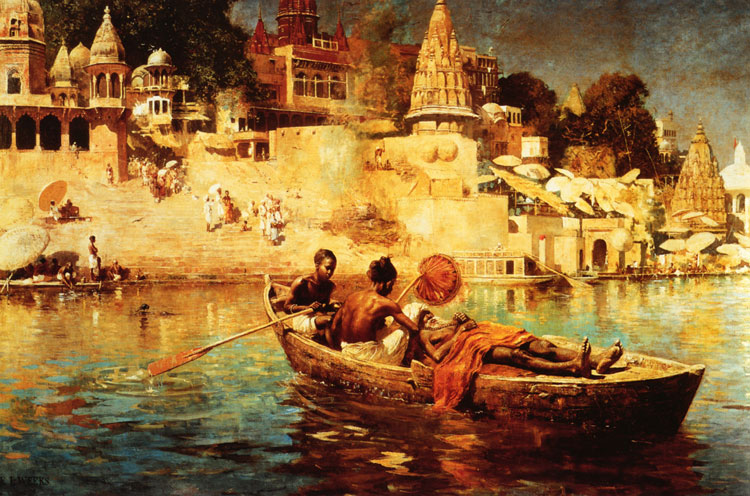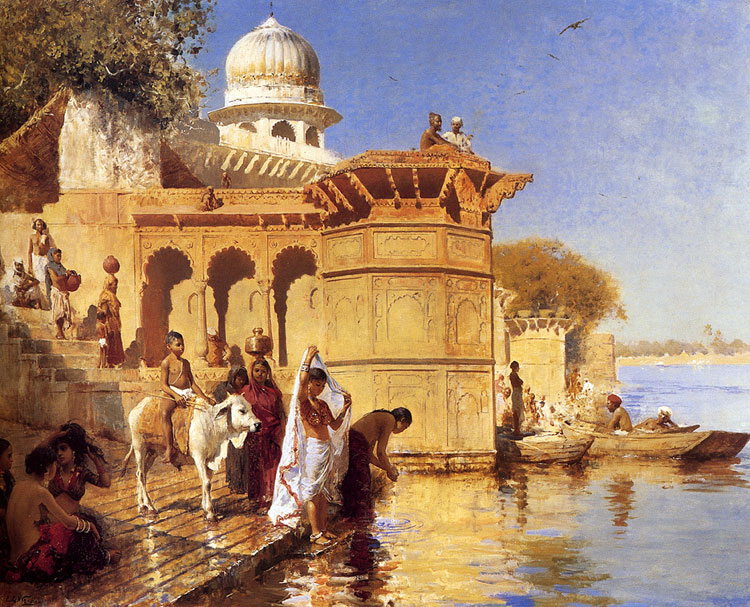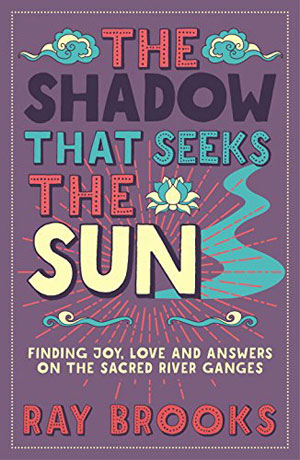
Photograph: [Public Domain] Wikimedia Commons
A story of yogis, bhogis and an unexpected encounter
“These magic moments are quite wonderful, but words cannot describe the beauty and the love of simply being. To be here, in this love, is easy.
All else is effort.”
Ray Brooks, writer, musician and recording artist, is internationally known in the world of shakuhachi or Japanese flute music. He has studied with many great shakuhachi masters and performed throughout Japan and overseas.
Born and raised in Newcastle-upon-Tyne, England, Ray and his wife, Dianne, have explored the world together and continue to spend most of their winters in the foothills of the Indian Himalaya, residing the rest of the year on Vancouver Island in Canada.
In this week’s guest post for The Culturium, Ray recounts his life-changing conversation with a humble holy man on the ghats of the River Ganges, who helped him to discover the very essence of his inner self.
HOW DID A completely undisciplined child—an utter waster in his twenties, who squandered the best part of his early life in pubs, wine bars and the nightclubs of London—find himself playing solo concerts in Japan on a shakuhachi Zen flute. This is the question most asked at my talks and workshops.
I wrote my first book, Blowing Zen: Finding an Authentic Life, as an attempt to respond to that question. Writing afforded me the opportunity to look back, in appreciation, at the moments of change in my life. I wrote the book with the hope that at least one person with thoughts of dissatisfaction in his or her life would be inspired into action.
I wrote Blowing Zen in 1999 and after sixteen years, three publishers, a German edition and the possibility of a film, the book is still finding readers. From the hundreds of emails I’ve received, I discovered that some, who had never heard of the shakuhachi, took up the instrument and are still playing to this day. Two players that I know of found teachers and became proficient enough to be claimed as masters.
Blowing Zen touched people from all walks of life. Jack Kornfield, author of A Path with Heart said the book was, “… a genuine spiritual journey, finding Zen, music and one’s own true self. A lovely spirit blows through this book.” Dan Millman, author of The Way of the Peaceful Warrior said, “In sharing his quest, [Ray] has enriched my life, and may inspire many others on the path of music, the ways of Zen.”
The utter waster was now a well known shakuhachi player with students and shakuhachi recordings, who went on book tours and travelled to Japan to hold solo concerts. I had a wonderful relationship and a fantastic life, but still, there was something missing. There was a huge sense of separation; a sense of what Jiddu Krishnamurti called “the observer and the observed”. There was still a sense of “me” and “other”. I still suffered.
I was so determined to understand this separation that I boarded a plane in London and went to Ojai, California, to hear Krishnamurti speak. I even managed to have a one-on-one meeting with him.
After that meeting with Krishnamurti and for the next twenty years or more, I earnestly tried to solve the problem of the “observer and the observed, knowing and known”. I once told a group of seekers that “I was so very close to solving the problem”.
Of course, knowing and known can never be separated. They have never even been apart. Only thought gives the illusion that there is separation between knowing and known. Knowing beyond doubt that there are not “two things” anywhere to be found is what we might call happiness. Thinking they are separate is what we call suffering.
It wasn’t just Krishnamurti that I went to for help. I studied traditional Vedanta in India through Swami Dayananda and others. I fell in love with the work of Sri Ramana Maharshi. I sat in front of some of the many excellent teachers on the nonduality circuit, gaining great knowledge about nonduality. The knowledge that there is only oneness, one without a second, Brahman, did not dispel the ignorance. I even had a “spiritual experience”! I believed that the separation was still very much there … so said thought.
It was in 2007, shortly after meeting an Anglo-Indian man by the River Ganges in Rishikesh, India, that the “penny dropped”. We were sitting on the ghats and I was explaining to him about my spiritual experiences, among other things, and when I’d finished, all he said was, “Ray, is any of what you’ve just said true?”
That was the beginning of our many talks together. These talks became the catalyst for my second book, The Shadow That Seeks the Sun, a story of yogis, bhogis and an unexpected encounter. The man’s name was Rudra, an intriguing Anglo-India man met by chance on the ghats, and it was he who questioned every belief that I had.
With Rudra’s guidance, these simple, yet profound talks challenged my long-held spiritual beliefs by pointing to that which is ever present but completely overlooked—our true nature.

Photograph: [Public Domain] Wikimedia Commons
Talk One
“It’s funny, I feel such an exquisite sense of freedom just sitting here next to the Ganga talking with you, Rudra. This qualifies as one of those magic moments I was telling you about. If there was nothing more than this, it would be enough.”
“You know, Ray …” He hesitated, perhaps unsure whether to carry on. “… heightened experiences only have significance if they point to what is already here.”
“Well, I’ve always felt that they point to something beyond the ordinary. I doubt if I’d be sitting here with you today if it weren’t for these experiences. More than likely, I’d be caught up in the system, living the whole ‘catastrophe’. They’ve motivated me to make changes, to keep going, to keep discovering more about myself.”
Rudra nodded unconvincingly and looked out across the river. Undeterred, I carried on.
“I’d like to think these experiences have brought me to this point, Rudra. It was a heightened experience that changed the direction of my life, many years ago.”
“Ray …” He hesitated again. This time there was a long pause before he spoke. “Ray, is any of what you’ve just said true?”
I was startled by the directness of his question.
“You see, there are no ‘experiences’. There is only experience. For there to be experiences there would have to be ‘someone’ to have them. For there to be someone, the knowing and the known would have to be separate. If you’re really interested in the truth you have to see this.”
“I know what you’re referring to, but that has never been my experience. I’m certain that what I’m looking for is connected to these experiences. They’ve shown me that there’s more to life than the mundane and that there is the possibility of freedom.”
“Whether you recognize it or not, you have never been apart from experience. Have you ever experienced a time when there wasn’t experience? If you have, how would you know? Ray, what you’re looking for is not found in experiences. What you’re looking for is beyond the very idea of freedom itself and not in future ‘experiences’. If we don’t remain open and aware of what these ‘experiences’ are directly pointing to, it’s easy to be carried away by them and to make the mistake of believing yourself to be something perceived—something separate from that which is already present. Without seeing this clearly, and based on what you’ve said, you will always be searching for freedom in some future experience and missing the obvious.”
“The obvious? What is the obvious that I’m missing, Rudra?”
“This, Ray. The last place you look—your actual experience, which is right here. This changeless experience is so familiar, so obvious that it goes unnoticed. As for ‘experiences’ bringing you to this point, how could anything bring you to where you have never left, or could ever leave? No matter how sublime the experience, it only ever points to this, where you already are.”
I looked away, unable to stand the scrutiny of his gaze any longer.
“Stop resisting what you’re hearing for a moment, Ray, and look at your experience right now. What do you find?”
“What I find is you and I talking together sitting by the river.”
“I wasn’t asking you for a story about what is apparently going on. Close your eyes and look. What do you find?”
Without giving a description, I was unsure how to answer.
“Well, just me.”
“Yes, just the experience of what you normally refer to as you? So you find only experience, right?”
“I just want to be clear what you mean by the word ‘experience’, Rudra.”
“What it feels like to be you—beingness.”
“Okay … Yes, then just experience.”
“You can find only being, yes?”
“… Yes, just being.”
“Irrefutable being that needs no proof—aware-beingness, that proves all else. Is there any effort required to know this beingness?”
“Well, no. None at all.”
“Right, there’s no effort or special conditions for it to be. It is so obvious that it is disregarded and believed to be a byproduct of the brain or some kind of higher power. When I used the word ‘obvious’, Ray, I wasn’t being condescending in any way. I’m referring to that which you have just seen clearly without any effort. That which is closer than close, yet totally overlooked. Just experience, as you are, and not what thought says that you are, or should be.”
“So you’re suggesting that these heightened experiences that I’ve had get in the way of finding the obvious?”
“You don’t have to find the obvious. You are the obvious. And what is stopping you from discovering this is the idea that being is not present and is found in some future experience. You’re only a glance away from seeing this for yourself. Why not trust your actual experience instead of trusting your beliefs?”
“But Rudra, the freedom during these experiences is unmistakable. If the clue to this freedom isn’t in our experiences, where else could it possibly be?”
“Ray, you’ve just seen where it is. Where else could it be? All that keeps you from seeing this is the common belief that ‘someone’ is having an experience. You and experience are not two things. There is only ever experience. Sorry, I’m already making it sound too complicated. It’s much simpler than words can express.”
I could hardly believe the direction our conversation was taking. Apart from Krishnamurti, I had never met anyone who spoke with such insight and certainty. He was so open and at ease, and there was not a trace of preaching in his voice. I felt exhilarated in his company and was definitely in no hurry to leave.
“I can see you’re very interested in all of this, Ray. But as long as you believe that you are separate and independent from experience—that there is an inside self and an outside world—I can assure you that you’ll be like a dog chasing its own tail.”
“Ever since meeting Krishnamurti, intellectually, I have always known that the separation between the ‘experiencer’ and the ‘experience’ is the very root of the problem, but, in actuality, this has never become clear to me.”
“And it will never become clear as long as you believe you are looking from the point of view of an experiencer—a separate self.”
“Who or what is it that knows that ‘I’ and ‘experience’ are not separate?”
“That which is hearing this voice; the simple knowing of this current experience, without interpretation. All that you know of yourself, beyond any doubt, is that you are self-aware.”
I’d been sitting for almost an hour and the stone step was beginning to feel uncomfortably hard. I took off my jacket and sat on it. Rudra seemed to realize that I needed time to digest what he was saying and paused for several minutes.
“When you see clearly that there is only one ‘knowing’, one timeless experience of this, what could possibly trouble you but imagination?” He paused. “Ray, we’re entering territory that will take more than a few minutes to explore. Do you have time to continue?”
“Yes, I have plenty of time.”

Photograph: [Public Domain] Wikimedia Commons
“Good question … Well, it’s as if I have one foot in the past and one foot in the future. Longing for something—’becoming’ might be a good word to describe it. A feeling of being unsettled might sum it up.”
“Unsettled, yes. Wanting things to be different. Is that sense of not being complete with you now?”
“Now? No. Not at all. I’m really enjoying our talk and there’s an experience of wellbeing. I’m just here. I’m present and I’m aware. I couldn’t think of a better place to be.”
“Be careful here. Present and aware are not two separate things. Presence-awareness is the experience of beingness itself. So, yes, there is just experience—the indescribable certainty that you exist. When I use the word ‘experience’, I am not referring to experiences in time, but only the awareness of ‘now’, which are one and the same.”
“I’m more familiar with using the word ‘awareness’ in these types of conversations. Are you using ‘experience’ as a synonym for ‘awareness’?”
“Yes. Awareness is just another name for experience. The meaning of awareness can be misunderstood and abstract, where experience is known by all. So, Ray, when you look now, there is only the certainty of experience—this aware-beingness. There’s not a sense of becoming or wanting a more pleasurable experience.”
“Yes, that’s right. There’s just aware-beingness.”
“Have you ever known a time when you were not this aware-beingness?”
“Well, there are moments when I’m busy and I forget that I’m aware, or when I’m lost in thought and off in a dream world.”
“For thought to be at all, surely awareness must be there. You would have to be present for thought to arise, wouldn’t you? If not—if something has existence outside of awareness—it would have to be a belief, wouldn’t it?”
Although somewhat mystified, I was fully absorbed by his words. Rudra could see that I was grappling with his statements and kept quiet again for a moment.
“Ray, ‘experience’ or ‘awareness’ or whatever you want to call it, are just other names for ‘you’. That is, the simple sense of ‘I’.”
“I’ve always thought ‘I’ was the problem.”
“We are not talking about the ‘I’ belief that comes with a story of past and future. I’m referring to the simple experience of ‘I’ that is complete and perfect. Beingness itself.”
“If beingness is already complete, why does it leave perfection and go in search of a better state? That seems to be all it ever does.”
“You never leave perfection to go on a search. There’s not two of you; one looking for another. Thought appears unauthored, just like any other appearance, creating the illusion of separation. Once this seamless oneness divides into entities—mind, objects and world—the divisions seem very real. Then thought goes on an endless path, searching for a self that has never been lost. It’s a futile path. Like a shadow that seeks the sun.”
Rudra paused and stared across the river.
“Ray, there is only ever this—this present moment—and it is all you. Without you, awareness, nothing could possibly be.”
I looked at the scene around me. The sun illuminated the pink walls of the ashram across the river. About one hundred yards to my left, a pack of dogs were barking and fighting over something snatched from the remains of a smoldering funeral pyre. A songbird alighted on a nearby rock, shook its feathers, bobbed its tiny body, and began to sing with startling volume and beauty.
“As I said, Rudra, apart from a few glimpses, I understand what you’re saying only conceptually. I’ve tried so hard, for so long, to see this. In truth, there’s something I’m just not getting.”
“Something thought is not getting—thought cannot get this. Thought cannot know peace. It can only know about peace. Ray, it sounds as if you simply want to move from where you are to where you want to be. That new place is peace and happiness. Is this true?”
For a moment, the beauty of the bird’s song overpowered his question. I looked at Rudra and then back at the bird, but it was gone.
“Yes,” I said, a little disappointed with my answer. “As you’ve said, Rudra, everyone is looking for peace and happiness.”
“Ray, peace is not somewhere else. Peace is no other than the absence of resistance to what ‘is’. It is your ever-present nature, the light of aware-presence. It could never cease to shine. The difficulty lies in explaining its utter simplicity.”
Rudra’s words were firm but the timbre of his voice never changed and his expression remained calm. The Muni paraded past us again on what must have been his fifth lap. We didn’t speak for a few minutes.
“Ray, I’m sorry, I’d really like to stay longer, but I must attend to some business in town.”
“Yes, of course, Rudra. I hope I haven’t kept you?”
“No, I have enough time to get there. Such a pleasure talking to you this morning. I hope our conversation has been helpful in some way.”
“It has. Would it be possible to meet again?”
“Yes, of course. I can’t tomorrow, but how about on Wednesday at the same time?”
“I’ll be here.”
We stood up and Rudra placed his palms together.
“Ray, these magic moments are quite wonderful, but words cannot describe the beauty and the love of simply being. To be here, in this love, is easy. All else is effort. Namaste.”
Post Notes
- Ray Brooks’ website
- Ray Brooks on Amazon
- Upahar: Bright Like a Million Suns
- Sri V. Ganesan: The Ultimate Question
- Hermann Hesse: The Journey to the East

